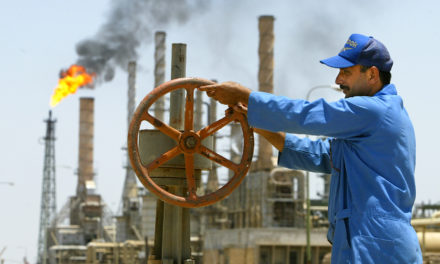(An official carries a ballot box, after a fire on June 10 at storage site housing boxes from general election. Reuters/Stringer)
Thursday’s ruling by the Federal Supreme Court to partially uphold parliament’s move to amend the electoral law has raised the specter of extended delays to the government formation process. Just how long it will take before a new government is approved by parliament depends on several factors that will determine the ability of Iraq’s competing coalitions to achieve a series of crucial milestones in a timely manner.
While some are predicting that negotiations could drag on into the new year, a realistic timeline should outline the key milestones that need to be achieved – as stipulated by the constitution – and the potential impediments along the way.
First: The Federal Supreme Court must ratify the final election results after taking into consideration all the appeals. This process is particularly complicated this year because of widespread allegations of voter fraud and irregularities. Parliament’s decision to dismiss the electoral commissioners and replace them with judges, in addition to amending the electoral law to force a full manual recount, means that five weeks after the elections, we are effectively back to square one.
Second: Once the results are ratified, the new parliament has 15 days to convene its first session, where it must elect the new Speaker and his/her two deputies. The next milestone involves electing the new President, who will then be tasked with calling on the largest bloc in parliament to designate its nominee for the premiership before submitting his/her cabinet for parliamentary approval. This entire process must take no longer than 90 days, as per the constitutional deadlines.
Third: Among the most critical aspects of the negotiations is determining the largest bloc in parliament. In terms of sequencing, it is theoretically possible for this to happen after the election of the new President, but in practical terms, it needs to be resolved before parliament convenes its first session so that the positions of Speaker and President can be agreed on as part of a broader deal among the competing coalitions.
Fourth: The final piece to the puzzle requires the largest parliamentary bloc to agree on its nominee for prime minister, who will have 30 days to submit his/her cabinet to parliament for approval.
Having outlined the core components of the government formation process, it is necessary to look at which potential obstacles could cause extended delays to the process.
The first and most unpredictable aspect is how long it will take for the newly-appointed judges in the electoral commission to complete the manual recount and resolve all allegations of fraud and irregularities. Based on previous elections, it typically takes about four weeks to complete the manual count, but this year’s elections have been complicated by widespread allegations of fraud in the Sunni and Kurdish provinces, as well as in out-of-country voting. Additionally, the commission will need to account for an unknown number of ballot boxes that were destroyed in the warehouse fire in Baghdad earlier this month. Furthermore, if the recount yields a significantly different outcome to the electronic count, we could see further delays in the Supreme Court’s final verdict. Just how long it will take for the electoral commission to complete its work is anyone’s guess at the moment, but even an optimistic outlook would suggest that final results will not be declared before the end of July.
The second major challenge is for the rival political coalitions to agree on an alliance that will be designated as the biggest parliamentary bloc. Initial efforts by Moqtada Al-Sadr’s Sa’iroon coalition to form a majoritarian government with Hikma, Nasr and Wataniya eventually ran out of steam, leading Sadr to announce a de facto alliance with his arch-rival Hadi Al-Ameri and the Fateh coalition. Given the current trajectory, the most likely outcome appears to be an alliance between the five largest election coalitions, namely Sa’iroon, Fateh, Nasr, State of Law and Hikma. Although both Sa’iroon and Nasr are reticent about allying with State of Law, it is unlikely that Nouri Al-Maliki will be left out of a grand coalition.
Integral to the formation of this potential alliance will be the negotiations over who will be nominated to lead the next government. While Prime Minister Haider Al-Abadi continues to be the frontrunner, it is still possible for an alternative candidate to emerge, particularly given the fact that State of Law, and to lesser degrees Fateh and Hikma, will be keen to prevent Al-Abadi from securing a second term. Nevertheless, of the five competing coalitions, Nasr’s chances of securing the premiership appear to be strongest by virtue of its acceptability both domestically and internationally.
Given the dynamics outlined above, is it possible to predict how long it will take to form the next government? A new government could be voted into office by November, assuming that the Supreme Court ratifies the results around the beginning of August. There would also be added pressure for Iraq’s political elite to arrive at a grand bargain before the end of the year, given the country’s commitments to international financiers and donors, namely the imperative to pass a 2019 federal budget in a timely manner. While the current government can continue to function relatively uninhibited over the summer, the monumental task of rebuilding and reforming the country requires political stability that can only be attained through a comprehensive agenda that enjoys the backing of a newly elected parliament.

Ali Hadi Al-Musawi
Ali Hadi Al-Musawi is an Iraqi analyst and contributing writer at 1001 Iraqi Thoughts.










